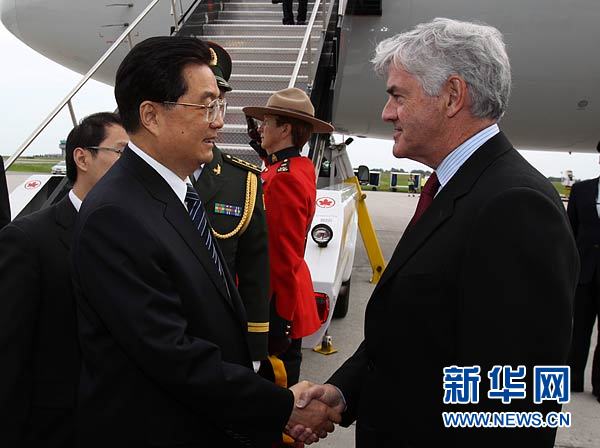Hu arrives in Canada for state visit, G20 summit
"Canada and China are laying the groundwork for a new decade of growth by deepening cooperation in a wide number of areas," said Canadian Prime Minister Harper in a statement on Hu's visit last Friday.
"It is a fitting tribute to 40 years of diplomatic relations based on mutual respect and collaboration," he said.
From Ottawa, President Hu will travel to Toronto to attend the G20 summit.
 |
|
Chinese President Hu Jintao arrives at the airport in Ottawa for a state visit to Canada, June 23, 2010. Hu was greeted at the airport by Canadian Foreign Minister Lawrence Cannon. |
Hu attended the Washington summit in November 2008, the London summit in April 2009 and the Pittsburgh summit last September.
At the previous three summits, leaders of G20 members coordinated global response to the financial and economic crisis, implemented stimulus measures to restore the world economy, and agreed on actions to strengthen financial regulation and the reform of international financial institutions. They also agreed to promote trade and resist protectionism.
The interventions by G20 members have effectively mitigated the impact of the crisis, and promoted a quicker transition to economic recovery.
"The G20 Toronto Summit will focus on recovery from the global economic and financial crisis and the implementation of commitments from previous G20 summits, while laying the foundation for sustainable and balanced growth," says a document entitled "G20 Toronto Summit" issued by Canada, the host of the summit.
A senior Chinese official said that at the Toronto summit over the weekend, the leaders are expected to discuss a wide range of issues, such as the world economic situation, the European debt crisis, the Framework for Strong, Sustainable and Balanced Growth, the reform of the international financial institutions, the world trade and the strengthening of financial regulations.
"China hopes that the G20 members at the Toronto summit would fully implement the Framework for Strong, Sustainable and Balanced Growth and enhance communication and coordination of macro-economic policies to support the global economic recovery," said Cui Tiankai, vice foreign minister of China, at a press conference last Friday.
He said that G20 members should push the International Monetary Fund (IMF) to finish a new round of quota reform to give more representation to emerging markets and developing countries before the Seoul summit in November this year, improve the international financial system and deepen the reform of the international regulatory system.
At Toronto meeting, the G20 leaders should pay greater attention to development problems and provide political support to the United Nations' high-level meeting on the Millennium Development Goals in September this year, and oppose trade protectionism and promote the completion of the Doha round of trade talks, he added.
Established in 1999, the G20 consists of Argentina, Australia, Brazil, Canada, China, France, Germany, India, Indonesia, Italy, Japan, Mexico, the Republic of Korea, Russia, Saudi Arabia, South Africa, Turkey, Britain, the United States and the European Union.
 0
0 






